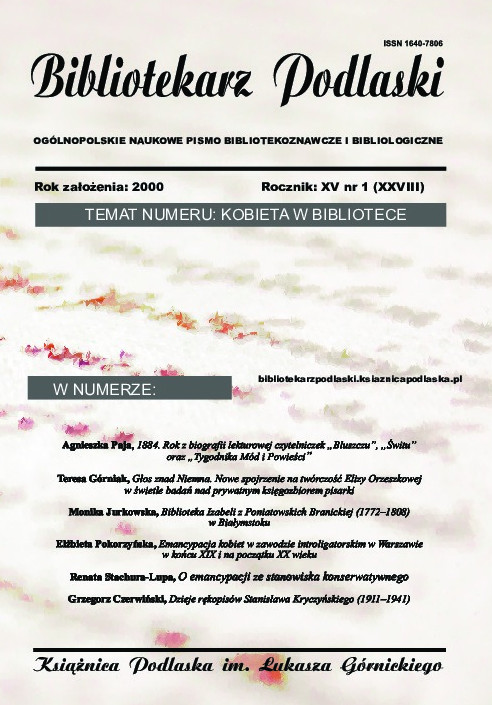Abstract
The author considers autobiographical accounts of the women - Polish prisoners - sent to Soviet forced-labour camps, mainly to Siberia and Kazakhstan, during World War II. The methodological approach assumed in the examination consists in focusing on narrative details (for example, prisoners’ possessions), on the basis on which individual experience is revealed. The record of such experience is found in allegedly “objective” descriptions of the surroundings and everyday objects. This is tantamount to a turn toward micro-histories and individual memory. However, thanks to the juxtaposition of diverse relations there emerges a panoramic view: detailed and providing an insight into the realities of the life in exile.
References
Konarska F., Liście na wietrze, wyd. 3 uzup., Warszawa 2005.
Kowalewski J., Wprowadzenie, w: Rzeczy i ludzie. Humanistyka wobec materialności, red. J. Kowalewski, W. Piasek, M. Śliwa, Olsztyn 2008.
Łukasik L., Kufer pamięci, Piła 2006.
Obertyńska B. [Marta Rudzka], W domu niewoli, posł. A. Szostkiewicz, Warszawa 2005.
Piotrowska-Dubik B., Kwiaty na stepie. Pamiętnik z zesłania, wyd. 3 popr. i uzup., Warszawa 2007.
Ritz G., Gatunek literacki a ‘gender’. Zarys problematyki, w: Genologia dzisiaj, pod red. W. Boleckiego, Warszawa 2000.
Skarga B., Po wyzwoleniu... (1944-1956), Kraków 2008.
Articles published in the “gold open access” mode on the basis of a non-exclusive license agreement between the publisher and the author. Permitted use:
- the publication may be read and stored on any device,
- the publication may be cited (with obligatory reference to the author, the title of the text, as well as the full title, bibliographic address of the issue and page of the journal)
The editorial team of “Bibliotekarz Podlaski” implements an open access policy by publishing materials in the form of the so-called Gold Open Access. From volume 42 (issue 1/2019), the journal is available under the Creative Commons license (Attribution – ShareAlike: CC BY-SA).
The key declarations of the Open Access and Open Science movement, which we fully support, are available on the CEON Open Science website.
COPYRIGHT:
The editorial team of “Bibliotekarz Podlaski” implements an open access policy by publishing materials in the form of the so-called Gold Open Access. The journal is available under the Creative Commons license – Attribution – ShareAlike 4.0: International: CC BY-SA 4.0).
The key declarations of the Open Access and Open Science movement, which we fully support, are available on the CEON Open Science website.
“Bibliotekarz Podlaski” allows its readers to read, download, copy, distribute, print, search and link to the full content of articles. We enable full, immediate, unlimited (both in a territorial, temporal and technical sense) open access to all published content, in accordance with the principle that freely available research increases and accelerates the global development of science and the exchange of knowledge.
The editorial team of “Bibliotekarz Podlaski” encourages authors to place articles published in the journal in open repositories (after the review or the final version of the publisher), provided that a link to the journal’s website is provided.
The journal does not charge the authors any fees for accepting and publishing their texts.

